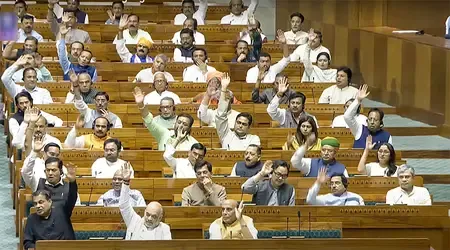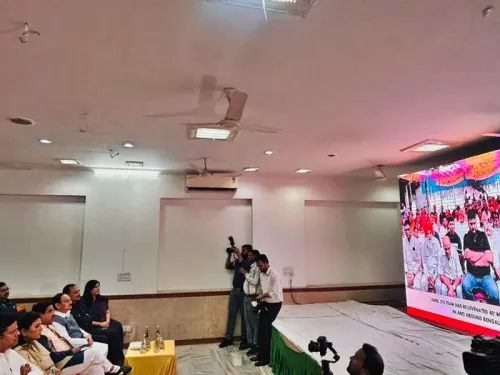Lok Sabha Approves Waqf (Amendment) Bill Following Extended Debate

Synopsis
Key Takeaways
- Waqf (Amendment) Bill passed in Lok Sabha with 288 votes.
- Union Home Minister Amit Shah criticized previous amendments.
- Bill aims to enhance accountability in Waqf Board.
- Opposition claims Bill targets the Muslim community.
- Support for the Bill from National Commission for Minorities.
New Delhi, April 3 (NationPress) The Waqf (Amendment) Bill became a central topic of discussion on Wednesday as it was presented in the Lower House of Parliament. Following an extensive debate lasting nearly 12 hours, the Bill was ultimately passed in the Lok Sabha in the early hours of Thursday. It received approval from the Lower House with a majority of 288 votes to 232.
During the debate, Union Home Minister Amit Shah strongly criticized the previous UPA government and voiced concerns over the 2013 amendments to Waqf laws, which he described as politically motivated and hastily implemented before the 2014 elections. He pointed out the significant repercussions of these amendments, including the transfer of 123 VVIP properties in Delhi’s Lutyens area to Waqf authorities.
HM Shah argued that the current Bill would not have been necessary had these earlier amendments not occurred. He underscored the importance of the Waqf Board in ensuring accountability and preventing financial mismanagement.
Before the vote, Union Parliamentary Affairs Minister Kiren Rijiju robustly defended the government against accusations of targeting the Muslim community and fostering divisions. He remarked, “You claim our government is against Muslims; yet, it was your actions that created fragmentation by establishing separate boards for Sunni, Shia, and other sects. We proposed a unified board to promote unity.”
He clarified the differences between Waqf and the Waqf Board, addressing worries about non-Muslim involvement in religious matters. “The court's order was presented, yet you refuse to acknowledge the truth. After the Home Minister’s thorough explanation, this issue should not have resurfaced.”
Regarding the role of the collector, he stated: “The collector’s responsibilities include revenue and administration; he is the district’s welfare officer. If we cannot trust him, who can we trust?”
Amidst controversies, Rijiju emphasized the necessity for decisive actions and accurate documentation. Responding to MP Asaduddin Owaisi’s assertion that the Bill insults Muslims and questioned why similar measures weren't applicable to Hindus, Rijiju pointed out, “Provisions for Hindus already exist. For Islam, we are instituting measures for women and children, who are citizens of this nation.”
He added, “If someone claims ancestral land usage, the Waqf now demands proof. This is beyond religion. Legal registration is sufficient, regardless of faith - all lands belong to the nation.”
Opposing the Bill, AIMIM chief and Hyderabad MP Asaduddin Owaisi criticized it vehemently.
Jagdambika Pal, Chairman of the Joint Parliamentary Committee (JPC) on the Waqf (Amendment) Bill, asserted earlier on Wednesday that the Bill would be passed in Parliament and would provide significant advantages to the Muslim community.
In conversation with IANS, Pal stated, “We have worked tirelessly for six months to present a detailed report on this Bill. The Opposition has made numerous claims, asserting it will be used to gain votes in the Bihar Assembly elections. However, despite such unfounded allegations, the Bill will be passed today.”
Amidst concerns and criticisms, Syed Naseruddin Chishty, Chairman of the All India Sufi Sajjadanashin Council, dismissed assertions from certain Muslim organizations claiming that religious properties would be seized upon the passage of the Waqf (Amendment) Bill. He urged the public not to believe such claims, stating that the Bill aims to implement stricter regulations to prevent the misuse of Waqf properties.
In the House, Congress Lok Sabha MP Gaurav Gogoi vehemently opposed the Bill, labeling it an “attack” on Parliament and the Constitution. He alleged that the government harbored four “key objectives” behind the Bill, which he claimed are aimed at the Muslim community.
Samajwadi Party President Akhilesh Yadav also sharply criticized the government, asserting that the introduction of the Waqf Bill represented its failures. Participating in the debate on the Waqf Board Amendment Bill 2025 in Lok Sabha, he questioned the coherence of terms like “Unified Waqf Management,” suggesting that the essence of the Bill, whether articulated in English or Hindi, remained unclear.
Senior Congress leader Rashid Alvi assured on Wednesday that the Congress would revise the Waqf law when it comes to power in 2029, as the Lok Sabha witnessed a spirited discussion on the Waqf (Amendment) Bill, 2025, introduced by a JPC and presented by Kiren Rijiju for consideration and passage.
National Commission for Minorities (NCM) chairman Iqbal Singh Lalpura expressed support for the Waqf (Amendment) Bill on Wednesday, as the Lok Sabha engaged in a lengthy discussion on the contentious legislation. Lalpura told IANS that the legislation serves the greater interest of the community and will not harm individuals of the Muslim faith.
Meanwhile, all political parties from Jammu and Kashmir, excluding the BJP, opposed the Waqf (Amendment) Bill, arguing it is designed to disempower Muslims and solely target one religion. Chief Minister Omar Abdullah stated that the Bill is unacceptable to his party.
Congress Spokesperson Pawan Khera condemned the Waqf (Amendment) Bill, labeling it as not only “anti-Muslim” but also “anti-constitutional.” Khera asserted that the Bill directly assaults the fundamental principles of the Indian Constitution, particularly those envisioned by B.R. Ambedkar - “equality, federalism, and minority rights.”
K.C. Venugopal, Congress MP from Kerala, launched a fierce attack on the Centre regarding the ‘discriminatory’ Waqf Amendment Bill, stating that the sole aim behind this controversial legislation was to advance its agenda of hatred and divide the country on religious lines.









